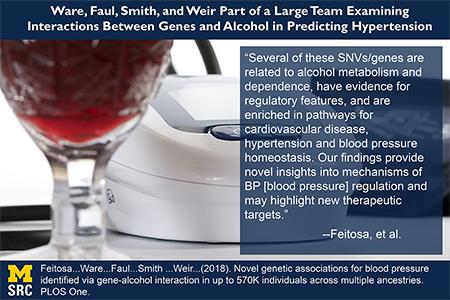July 27, 2018
Ware, Faul, Smith, and Weir Part of a Large Team Examining Interactions Between Genes and Alcohol in Predicting Hypertension
 SRC Scientists Erin B. Ware, Jessica Faul, Jennifer Smith, and David Weir recently collaborated with a large team of researchers that collectively make up the CHARGE Gene-Lifestyle Interactions Working Group to publish a novel analysis of the interactions between specific genes and alcohol consumption when predicting hypertension. Their study was published in the widely read interdisciplinary journal PLoS ONE, and since the article was published in June 2018, it has been viewed online more than 830 times, underscoring the importance of this work. Hypertension is a critical public health problem worldwide and understanding the biological mechanisms that could explain it, especially as they relate to alcohol consumption, is essential for improving the human condition.
SRC Scientists Erin B. Ware, Jessica Faul, Jennifer Smith, and David Weir recently collaborated with a large team of researchers that collectively make up the CHARGE Gene-Lifestyle Interactions Working Group to publish a novel analysis of the interactions between specific genes and alcohol consumption when predicting hypertension. Their study was published in the widely read interdisciplinary journal PLoS ONE, and since the article was published in June 2018, it has been viewed online more than 830 times, underscoring the importance of this work. Hypertension is a critical public health problem worldwide and understanding the biological mechanisms that could explain it, especially as they relate to alcohol consumption, is essential for improving the human condition.
These four SRC colleagues and their collaborators are doing truly innovative biosocial research, and this article is a prime example of the fascinating knowledge that this blossoming field is producing. As the authors note, it is unclear how alcohol consumption currently affects blood pressure regularization, and they sought to investigate whether consumption would interact with certain genes to effectively predict blood pressure outcomes.
The research team performed a state-of-the-art genetic analysis that featured two stages. In the first stage, they performed genome-wide discovery meta-analyses of nearly 131,000 individuals from a variety of ancestries, primarily to identify single nucleotide variants (SNVs) that were associated with blood pressure for individuals with different drinking status (e.g., current drinkers). The team found more than 3,500 SNVs that had significant associations with blood pressure outcomes (after adjusting for the large number of tests performed), and the associations did vary based on drinking status. They then sought to replicate these findings in a second stage, analyzing more than 440,000 individuals (again across a variety of ancestries) and finding those SNVs (out of the more than 3,500 identified in the first stage) that were once again significantly associated with blood pressure. In all their analyses, they studied variations in the associations depending on alcohol consumption status, and they ultimately reported novel associations of selected genes with blood pressure outcomes in addition to replications of prior work.
In the end, the authors were able to find novel loci of genes that were found to have strong associations with blood pressure outcomes for different subgroups defined by drinking status, representing the main contribution of this massive study. Interestingly, the authors report that the novel loci were different depending on ancestry. The authors conclude by noting that 'Several of these SNVs/genes are related to alcohol metabolism and dependence, have evidence for regulatory features, and are enriched in pathways for cardiovascular disease, hypertension and blood pressure homeostasis. Our findings provide novel insights into mechanisms of BP [blood pressure] regulation and may highlight new therapeutic targets.' I really appreciated this concluding emphasis on potential targets for therapy; wouldn't it be wonderful if innovative studies like this could ultimately lead to simultaneous improvements in blood pressure and alcohol dependence?
Mary F. Feitosa…Erin B. Ware…Jessica Faul…Jennifer A. Smith …David Weir…(2018). Novel genetic associations for blood pressure identified via gene-alcohol interaction in up to 570K individuals across multiple ancestries. PLOS One.